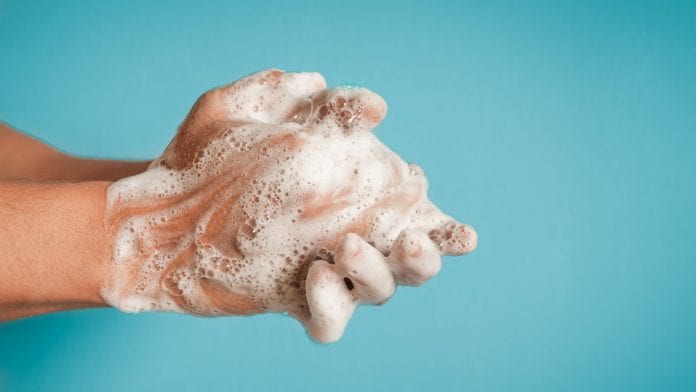
SureWash provides a cost effective hand hygiene training solution to help achieve compliance, reduce the risk of infections and improve patient outcomes.
In studies of healthcare workers in Germany, the UK, and Switzerland, it was found that only about 15% of people were cleaning their hands effectively. However, 60% of participants were confident that their hands were clean. The hands are the biggest vector for the transmission of infections in hospitals and beyond. Healthcare workers have been trained in hand hygiene since the days of Florence Nightingale, but it is clearly time for a new approach.
Hand hygiene training
SureWash is a hand hygiene training company founded by Trinity College Dublin Professor Dr Gerard Lacey. The company teaches the World Health Organization’s (WHO) six-pose technique to more than 200 hospitals and universities worldwide. Its interactive software system uses augmented reality to deliver training to globally approved standards. Repetition of the technique is critical to learning; therefore, gamification has been used to make learning fun and engaging. It also enables training to be shifted from the classroom setting into the hospital environment. These elements combine to encourage repeated training among healthcare professionals.
SureWash kiosks are moved around the hospitals to deliver training in the workplace. The kiosks also deliver short infection control lessons and quizzes to assess the standard of knowledge in an organisation and to identify gaps in learning. These short bursts of learning can be personalised to each organisation; and training is available 24 hours a day, 365 days a year, in multiple languages. This ensures a hospital is prepared for an outbreak situation, as customised training can be rolled out rapidly and skills refreshed at critical times.
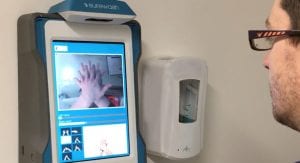
How it works: the science
SureWash uses Artificial Intelligence (AI) and a video camera to measure the user’s hand hygiene practice; and provides real time feedback to help them improve. The WHO technique can be perceived as complex and difficult to learn. To tackle this, SureWash divides hand hygiene learning into a series of levels, each with a challenge. At the beginning there are lots of prompts and plenty of time to complete each of the six poses; then as the learner moves through the levels, the prompts are reduced and the time gets shorter. In the final step, the learner must repeat the technique from memory and the SureWash unit will assess their proficiency. Throughout the learning process, SureWash provides feedback to help the user improve.
Learning is best delivered as short bursts over two weeks. Multiple studies have shown that this ‘practise-rest-repeat’ technique is the best way to learn psychomotor skills. Research has shown that it takes about 20 to 30 training sessions over two weeks to integrate the habit of good hand hygiene into the user’s muscle memory. A study conducted at Yale Medical School using the SureWash GO examined the amount of training required to reach proficiency; and found that over a five-day period, users take on average 32 hand hygiene training sessions or a total of 23 minutes’ training to develop the skill. Participants were determined to be proficient when they could complete the six-step WHO technique in under 42 seconds.
Addressing common omissions
Hand hygiene technique is essential in the healthcare sector; and studies have shown that the WHO six-step technique is measurably better than the three-step to ensure that hands are cleaned thoroughly. However, the WHO technique is difficult not only to learn, but also to teach. Therefore, SureWash has focused on delivering training which builds muscle memory and engages professionals in a positive learning experience. Research has identified that the most common areas missed when cleaning hands are the thumbs and fingertips. Similarly, SureWash training data also indicates that the thumbs and fingertips have the lowest pose scores. This identifies the need for repeated quality training and automated reporting in a healthcare facility. The SureWash system objectively assesses the user’s hand movements for each pose to ensure they remember how to clean their hands correctly every time. Therefore, with continuous training over time, the technique will become automatic, ensuring all surfaces of the hands are clean.
SureWash product range
The SureWash range consists of three different learning products. Each provides training and follow-up for all healthcare staff. The SureWash ELITE is the largest training unit, a cart-based kiosk which can be moved around the facility at ease to provide self-directed training. The SureWash GO is a smaller portable training system weighing just 4.5kg. It comes with its own moulded case for ease of transport. The SureWash Hand Hygiene APP is the newest addition to the SureWash training platform. The front camera is used on a mobile device to measure hand motions. Sue, the SureWash avatar and a hand hygiene expert, offers guidance to help users learn the technique, giving feedback on their progress. In light of COVID-19, the app is suitable for rapid rollout of training in a hospital setting. SureWash’s ease of deployment is a quick solution for teaching the WHO technique and helping to achieve compliance in hand hygiene among healthcare professionals.
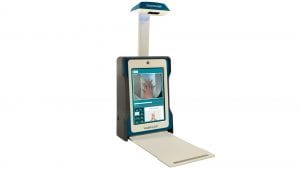
Audited training records
All SureWash hand hygiene training products connect to the SureWash.Net platform. The Reporting Suite on SureWash.Net is an audited training record for internal use and for regulatory bodies. It provides infection control personnel the ability to track and assess users’ learning progress over time. Once a SureWash unit is connected to wifi, all the data it holds is uploaded to the cloud. This data can be filtered based on different SureWash machines, staff departments, staff roles and date range. Hand hygiene assessment results along with high level analytics are then available from a desktop. An in-depth analysis of training records is available, with the opportunity to automate and aggregate data across organisations. Administrators are provided with high level analytics and key statistics such as how many staff members have completed the programme, which departments trained the most and the average pass rate among staff. Each report can also be exported into PDF or Excel format for printing, archiving, or further processing. All elements of the system combine to deliver a complete solution to hand hygiene training.
Hand hygiene reduces hospital-acquired infections (HAIs)
SureWash’s core mission is to reduce preventable HAIs. Healthcare settings can find it difficult to achieve hand hygiene compliance and to generate enthusiasm during the training process. SureWash aims to deliver a cost effective solution to the healthcare industry to help achieve compliance, reduce the risk of infections and improve patient outcomes. According to the WHO, approximately 50% of infections could be prevented with better hand hygiene. By following the WHO guidelines for hand hygiene, healthcare workers are ensuring all surfaces of their hands are clean. Our hands are the main pathways for the transmission of germs. To achieve compliance, healthcare workers must know when to clean their hands – observing the WHO’s five moments – and how, using the six-step technique. This is essential for healthcare providers to protect not only their patients, but themselves and other colleagues.
Engaging patients and visitors in hand hygiene
Practising proper hand hygiene is not only important for healthcare workers, but also patients and visitors. Where a SureWash system is present in a hospital setting, individuals are encouraged to approach it and complete a hand hygiene training session. Its ease of use results in patients and visitors finding it an engaging and positive experience. The SureWash Hand Hygiene APP is also available for the general public to download from both the Android and Apple store, enabling everyone to learn the correct way to clean their hands to reduce the spread of infections. By promoting hand hygiene among this cohort, individuals will be more conscious and aware of the importance of hand hygiene both in the hospital setting and in their everyday lives.
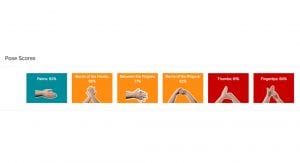
Artificial Intelligence (AI) in infection prevention
SureWash’s founder and CTO Dr Gerard Lacey has been researching hand hygiene systems and their evaluation in hospitals for 15 years. He has also participated in multiple scientific publications. His recent research has focused on potential applications of AI in the healthcare industry in areas such as hand hygiene, with findings indicating that on a surgical ward, automatic video auditing with feedback resulted in improvement in the quality and quantity of handwashing. However, once this feedback was removed, performance returned to baseline. This suggests that we become too dependent on technology in learning, also known as cognitive offloading. Technology needs to be implemented strategically in the learning process, while assessments, challenges and feedback are fundamental to delivering a high standard of training.
It is apparent that AI applications can significantly improve infection prevention and control. However, this needs to be supported by changes to culture and behaviour, along with governance structures, in order to be wholly effective. Senior leadership needs to continuously reinforce the importance of hand hygiene for patient, staff and visitor wellbeing. However, changing behaviour is not easy. Local teams need to have a sense of ownership of the strategy and shape the content: Didier Pittet of the WHO calls this ‘Adapt to Adopt’. Letting individuals be creative is key; and combining AI with this culture and behaviour change will help improve hand hygiene compliance. This is what is fundamental to improve infection prevention and control.
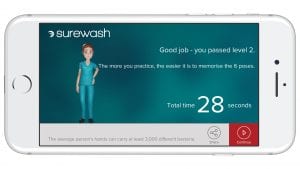
Danielle Nolan
Marketing Executive
SureWash
+353 (0)1 677 8894
info@surewash.com
surewash.com
This article is from issue 13 of Health Europa. Click here to get your free subscription today.







